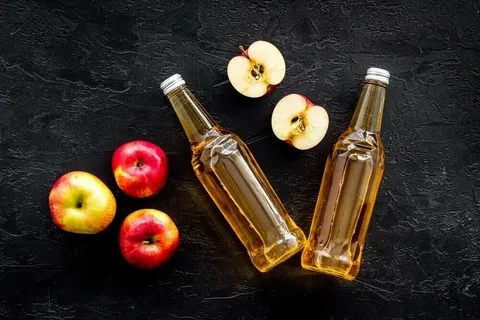Introduction
Apple cider vinegar (ACV) is a popular pantry staple known for its versatility and potential health benefits. From culinary uses to household cleaning and skincare, ACV has earned a reputation as a multipurpose product. However, like all food items, ACV can eventually spoil if not stored properly or used within a certain timeframe. In this comprehensive guide, we will explore the shelf life of apple cider vinegar, how to store it to maintain its quality, signs of spoilage, and answer frequently asked questions regarding its expiration.
Understanding Apple Cider Vinegar
ACV is made from fermented apple juice, which undergoes a two-step fermentation process. First, the natural sugars in the apples are converted into alcohol by yeast. Then, bacteria further ferment the alcohol into acetic acid, the primary compound responsible for ACV’s characteristic tangy flavor and acidic nature.
Shelf Life of Apple Cider Vinegar
Unlike some perishable food items, apple cider vinegar has an extended shelf life due to its acidic nature, which inhibits the growth of harmful bacteria. When stored properly, unopened bottles of ACV can remain stable for an extended period. However, once opened, ACV’s shelf life may be influenced by factors such as exposure to air, light, and contaminants.
Factors Affecting Shelf Life
Several factors can affect the shelf life of apple cider vinegar
Storage Conditions
Proper storage is crucial for maintaining the quality and longevity of ACV. Store it in a cool, dark place away from direct sunlight and heat sources to prevent oxidation and degradation of the product.
Container Quality
ACV should be stored in a tightly sealed container made of glass, plastic, or stainless steel to prevent exposure to air and contaminants.
Purity and Quality
: High-quality, unpasteurized apple cider vinegar with the “mother” intact may have a longer shelf life due to its higher acidity and presence of beneficial bacteria.
Signs of Spoilage
While apple cider vinegar has a long shelf life, it may eventually deteriorate in quality and flavor over time. Signs of spoilage include:
Cloudiness or Sediment
While some cloudiness or sediment is normal in unfiltered ACV, excessive cloudiness or the presence of mold or foreign particles may indicate spoilage.
Foul Odor
Spoiled ACV may develop a sharp, unpleasant odor resembling vinegar but stronger and more pungent.
Change in Taste
ACV should have a tangy, acidic flavor. If it tastes flat, bitter, or rancid, it may have gone bad.
Visible Mold
Mold growth on the surface or inside the bottle is a clear indication of spoilage and should be discarded.
Proper Storage of Apple Cider Vinegar
To prolong the shelf life and maintain the quality of apple cider vinegar, follow these storage tips:
Keep it Sealed
Always tightly seal the bottle after each use to prevent air exposure and contamination.
Store in a Cool, Dark Place
Keep ACV away from direct sunlight, heat sources, and fluctuating temperatures. A pantry or cupboard is an ideal storage location.
Avoid Contaminating the Bottle
Use clean utensils and avoid introducing contaminants into the bottle, such as fingers or dirty measuring spoons.
FAQs
Does apple cider vinegar expire?
While apple cider vinegar has a long shelf life, it may eventually degrade in quality over time. Pay attention to signs of spoilage such as cloudiness, foul odor, or mold growth.
How long does apple cider vinegar last once opened?
Once opened, apple cider vinegar can remain stable for about 1-2 years if stored properly. However, its quality may deteriorate over time, so it’s best to use it within a reasonable timeframe.
Can you use expired apple cider vinegar?
It’s generally safe to use apple cider vinegar past its expiration date if it appears and smells normal. However, its potency and flavor may have diminished, so it may not be as effective or enjoyable to use.
Can I refrigerate apple cider vinegar to extend its shelf life?
Refrigeration is not necessary for apple cider vinegar and may cause it to thicken or develop sediment. Store ACV in a cool, dark place at room temperature for optimal quality and shelf life.
Is it safe to consume cloudy apple cider vinegar?
Some cloudiness in unfiltered ACV is normal and indicates the presence of beneficial bacteria and enzymes. However, excessive cloudiness or the presence of mold should be considered signs of spoilage, and the vinegar should be discarded.
Can I use apple cider vinegar for cleaning or skincare if it’s expired?
Expired apple cider vinegar may still be suitable for cleaning or skincare purposes, as its acidic nature can help disinfect and balance the skin’s pH. However, for best results, use fresh, high-quality ACV whenever possible.
Conclusion
Apple cider vinegar is a versatile ingredient with numerous culinary, household, and health benefits. When stored properly and used within a reasonable timeframe, ACV can maintain its quality and potency for an extended period. Pay attention to signs of spoilage, follow proper storage guidelines, and use your senses to determine if ACV is still safe and suitable for consumption or other purposes. With proper care, apple cider vinegar can be a valuable addition to your pantry and daily routine.
- What Is Sapiosexuality And How It Shapes Attraction In The Digital Age? - June 1, 2025
- Profhilo Treatment Near Okewood, Surrey - May 31, 2025
- The Emotional Journey Of Being In A Pansexual Relationship - May 30, 2025



